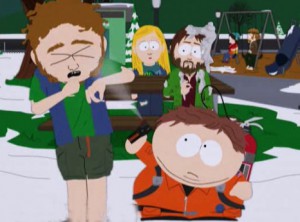If you’re familiar with the darkly funny animated series “South Park,” you know there’s nothing that tubby 9-year-old Eric Cartman hates more than hippies. In the 2005 episode “Die Hippie, Die,” he gallantly waddles from house to house with an exterminator tank, hell-bent on ridding the neighborhood of the bad-smelling, peace-preaching stoners. Well, in my small hometown in the late 1960s, we had but one authentic hippie, and we intended to keep him.
By the time the Age of Aquarius hit Pennsyltucky, it was already the Age of Libra. For years we stared at our cabinet TVs with envy at the scenes of flower-children burning draft cards in Chicago, marching for peace in D.C., and dancing in a hallucinogenic stupor in Golden Gate Park. Just when we’d nearly given up hope that we’d ever be hip, God answered our prayers and gave us something to break the monotony of our boring, bourgeois lives: a bearded, long-haired, blurry-eyed, sandaled dude whom the town elders affectionately called “The Dirty Hippie.” So touched was he by this moniker that he actually painted the nom de freak on the side of his psychedelically embellished pickup truck. You bet your bippy! What a treat to see him whiz by — “Sunshine of your Love” and fragrant smoke wafting from his windows — as we walked home from school. “Hey look! It’s the Dirty Hippie!” we’d cry out as we waved. I have no idea whether our token tokin’ rebel embraced the make-love-not-war ideology of the times, but he looked like he stepped right out of central casting for “Easy Rider.” And that was good enough for us. We didn’t want any trouble-making pinko types, anyway. We weren’t ready for our small hamlet to become infested with the city-bred rodent variety of hippie — like those personified by David Peel.
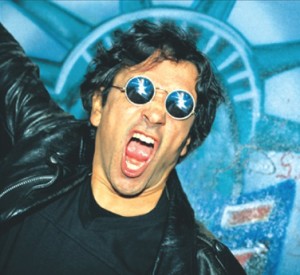 I was 12 years old, watching The David Frost show on TV after school, when I discovered Mr. Peel. As the veddy, veddy British talk show host introduced a musical number, I was delighted to see John Lennon on stage with an assortment of musicians I didn’t recognize. But why was John (and the ubiquitous Yoko) standing in the back, banging away on a homemade stringed instrument, and not in the spotlight? Who was the wire-haired dude with Lennonesque granny glasses shouting into the microphone? And why was he singing funny lyrics to Merle Haggard’s “Okie from Muskogee” song? This was too much!
I was 12 years old, watching The David Frost show on TV after school, when I discovered Mr. Peel. As the veddy, veddy British talk show host introduced a musical number, I was delighted to see John Lennon on stage with an assortment of musicians I didn’t recognize. But why was John (and the ubiquitous Yoko) standing in the back, banging away on a homemade stringed instrument, and not in the spotlight? Who was the wire-haired dude with Lennonesque granny glasses shouting into the microphone? And why was he singing funny lyrics to Merle Haggard’s “Okie from Muskogee” song? This was too much!
I’m proud to be a New York City hippie / I’m proud of dirty feet and dirty hair.
I’m proud of living with the cock-a-roaches / I’m proud of living in a garbage can.
We want to warn you squares and all you rednecks: If you hate the hippies from New York,
We’ll unify the hippies from the country /We’ll fight until the South becomes the North.
Wow! The high literature of Mad magazine set to music! This truly appealed to my 7th grade brain. I would never forget this TV performance, or the name of the singer, David Peel. And I vowed that one day I would learn all about this dirty hippie.
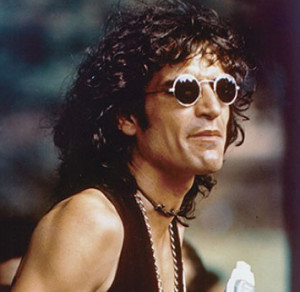 Born David Michael Rosario in Brooklyn, Peel was, and remains, a singer, songwriter, musician, activist, street performer, and self-described radical. In 1968, he and his band, The Lower East Side, landed a contract with Elektra Records and subsequently released two albums that were groundbreaking in theme and content: “Have a Marijuana” and “The American Revolution.” Kudos to Elektra for releasing LPs with song titles like “I’ve Got Some Grass,” “Hey Mr. Draft Board,” “I Want To Get High,” “Show Me the Way to Get Stoned,” and the police-hating “Oink, Oink.” Smells like early punk rock to me.
Born David Michael Rosario in Brooklyn, Peel was, and remains, a singer, songwriter, musician, activist, street performer, and self-described radical. In 1968, he and his band, The Lower East Side, landed a contract with Elektra Records and subsequently released two albums that were groundbreaking in theme and content: “Have a Marijuana” and “The American Revolution.” Kudos to Elektra for releasing LPs with song titles like “I’ve Got Some Grass,” “Hey Mr. Draft Board,” “I Want To Get High,” “Show Me the Way to Get Stoned,” and the police-hating “Oink, Oink.” Smells like early punk rock to me.
Peel has been described as the Woodie Guthrie of Yippie politics. He prided himself on being a street musician – of the people, by the people, for the people – and gained most of his notoriety shouting out his satirical ditties in Washington Square Park in Greenwich Village. Still, outside of New York counter-culture society, Peel remained very much an underground novelty. Until another radically minded singer-songwriter happened upon his act.
One day in 1971, two newly-minted New Yorkers, John and Yoko Ono Lennon, wandered into Washington Square Park with their friend, rock journalist and producer Howard Smith. There, John saw Peel for the first time. The street singer shouted out something like, “Why do you have to pay to see stars?” John thought that Peel was referring to him, and his interest was piqued. It wouldn’t be long before Yippie leaders Jerry Rubin and Abbie Hoffman would lead John back to the park and introduce him to Peel. They hit it off immediately. “He’s such a great guy,” said Lennon in 1972. “We loved his music and his spirit and everything — his whole philosophy of the street.”
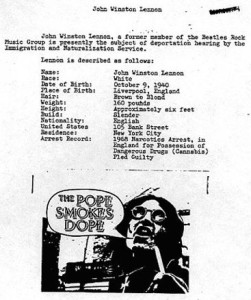 The next thing you know, John signs Peel to The Beatles’ Apple Records (against the objections of some of his former bandmates) and is producing his infamous LP, “The Pope Smokes Dope.” Its title song, along with such tunes as “F is Not a Dirty Word,” “I’m Gonna Start Another Riot,” and “The Birth Control Blues” ensured that the LP would be banned in nearly every country except the United States and Canada. Now, with John’s blessing and a banned record, Peel not only was the new darling of the anti-establishment, he had a free pass to enter the living rooms of Middle America by way of the David Frost show. With his round, wire-rimmed sunglasses and prominent nose, he looked so much like John that the FBI mistakenly used his photo in a fact sheet they produced for Nixon’s “deport Lennon” campaign.
The next thing you know, John signs Peel to The Beatles’ Apple Records (against the objections of some of his former bandmates) and is producing his infamous LP, “The Pope Smokes Dope.” Its title song, along with such tunes as “F is Not a Dirty Word,” “I’m Gonna Start Another Riot,” and “The Birth Control Blues” ensured that the LP would be banned in nearly every country except the United States and Canada. Now, with John’s blessing and a banned record, Peel not only was the new darling of the anti-establishment, he had a free pass to enter the living rooms of Middle America by way of the David Frost show. With his round, wire-rimmed sunglasses and prominent nose, he looked so much like John that the FBI mistakenly used his photo in a fact sheet they produced for Nixon’s “deport Lennon” campaign.
While John went on to produce Peel’s single, “America,” for the soundtrack of the film “Please Stand By,” Apple records did not renew his contract. Wary of censorship battles with established record labels, he formed an independent company, Orange Records, to release his own material and that of other artists. His 1976 LP, “An Evening With David Peel,” has been praised for perfectly capturing the sound and spirit of the chaotic early ’70s underground movement. He’s been recording, without fanfare, for decades. You can download his songs from iTunes and Amazon.com.
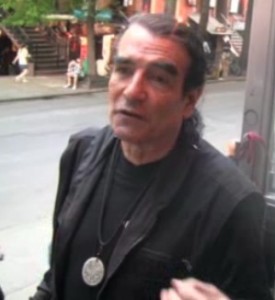
Thanks to Lennon’s association, Peel went from playing parks to stadiums, alongside such artists as Rod Stewart, B.B. King, Alice Cooper, Dr. John, Frank Zappa, Iggy Pop, MC5, John Lee Hooker, Roger McGuinn, Richie Havens, Odetta, Arlo Guthrie, Stevie Wonder, Joan Baez, Cypress Hill, and The Ramones.
But despite his high profile gigs, Peel’s always felt most comfortable on the streets of New York, performing gratis for everyday people. At age 70, he’s still a bachelor, sans children, and lives in a rent-controlled apartment on Avenue B in the East Village. He gets by on songwriting royalties, sales of old records, and the occasional gig. He’s made a comeback in recent years, writing songs for the Occupy Wall Street movement and singing and strumming his way into the hearts of a new generation of rabble rousers. He told a New York Times reporter in 2012 that he plans to continue to sing on the streets and in the parks “until the day I drop dead and go to rock ’n’ roll heaven.”
Let’s just hope there’s plenty of weed behind those pearly gates — if the popes haven’t smoked it all up, that is.
UPDATE: I just leaned that Mr. Peel died on April 6, 2017, following a heart attack. Wherever you are, David, keep stirring the pot!
Here’s David Peel and The Lower East Side, along with John, Yoko, and Jerry Rubin, performing “Hippie from New York City” on David Frost’s show in 1972. It’s a biting parody of Merle Haggard’s “Okie from Muskogee.”
Here are audio clips of John, discussing David’s appeal: “People say, ‘Oh, you know Peel – he can’t sing, or he can’t really play and that,’ but he writes beautiful songs, you know, and even sort of as simple as his basic chord structures are, supposedly. Well you know, Picasso spent 40 years trying to get as simple as that.”
This South Park clip is from the episode called “Die Hippie, Die,” which shows Eric Cartman trying to rid the town of hippies.
© Dana Spiardi, March 6, 2013
]]>
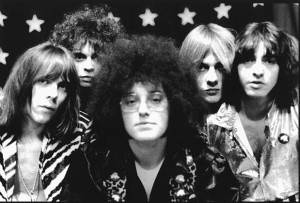 Through the years, The Great and Powerful retailer has banned countless CDs on the basis of album art and song lyrics they deem distasteful or obscene. These include releases by Nirvana, Sheryl Crow, Prince, Marilyn Manson, The Goo Goo Dolls and Green Day. While profit-obsessed record company execs may take offense at Walmart’s music policing, the artists themselves probably couldn’t care less whether the world’s largest, most dehumanizing, morally righteous retail chain carries their wares — especially in the age of digital downloads. But there was one band that didn’t take kindly to a department store’s refusal to stock their record. And they sought revenge.
Through the years, The Great and Powerful retailer has banned countless CDs on the basis of album art and song lyrics they deem distasteful or obscene. These include releases by Nirvana, Sheryl Crow, Prince, Marilyn Manson, The Goo Goo Dolls and Green Day. While profit-obsessed record company execs may take offense at Walmart’s music policing, the artists themselves probably couldn’t care less whether the world’s largest, most dehumanizing, morally righteous retail chain carries their wares — especially in the age of digital downloads. But there was one band that didn’t take kindly to a department store’s refusal to stock their record. And they sought revenge.
In the mid-1960s, a radically left-wing garage band called MC5 began making waves, both musically and politically, in their hometown of Detroit. They carried unloaded rifles onto the stage and ended performances with the lead singer falling dead from a fake sniper attack. According to guitarist Wayne Kramer, they played an 8-hour protest-driven set at the violence-filled 1968 Democratic National Convention when other musicians failed to show up. Controversy grew when band manager John Sinclair founded the White Panthers, a militant leftist organization of white people working to assist the Black Panthers. Soon afterwards he was jailed for marijuana possession.
In February 1969 the band released an album with a title that became a catch phrase: “Kick Out The Jams.” Kramer explained its meaning in an August 1970 interview with Disc & Echo magazine: “People said ‘oh wow, kick out the jams means break down restrictions,’ etc., and it made good copy, but when we wrote it we didn’t have that in mind. We first used the phrase when we were the house band at a ballroom in Detroit, and we played there every week with another band from the area. We got in the habit, being the sort of punks we are, of screaming at them to get off the stage, to kick out the jams, meaning stop jamming. We were saying it all the time and it became a sort of esoteric phrase.”
The album’s title song starts off with vocalist Rob Tyner shouting, “And right now… right now… right now it’s time to… kick out the jams, motherf**kers!” Outraged record label executives demanded the band remove the line. They refused.
Said Elektra Records founder Jac Holzman in his memoir, Follow the Music: The Life and High Times of Elektra Records in the Great Years of American Pop Culture, “We actually had ‘Kick Out The Jams’ in two versions, one with ‘motherf**ker,’ the other with ‘brothers and sisters.’ The single had ‘brothers and sisters.’ And with the album, stores could choose which version they preferred.
 “Somehow, Hudson’s, the retailing gorilla of the heartland, got the wrong version and reacted with the fury of a Midwestern twister. They instantly cleansed their shelves of the record, which mightily pissed off the MC5, who took out an ad in the local underground paper, saying ‘F**K HUDSON’S,’ signed MC5, with a very visible Elektra logo, and sent me the bill! In retaliation, Hudson’s purged not only MC5 but every other Elektra album…I said to the MC5, ‘Hey, guys, you can’t do that.’ They said, ‘Jac, we thought you were part of the revolution.’ I said, ‘I’m only interested in your music.'” [The full text of MC5’s ad read: “Kick out the jams, motherf**ker! And kick in the door if the store won’t sell you the album on Elektra. F**k Hudson’s!”]
“Somehow, Hudson’s, the retailing gorilla of the heartland, got the wrong version and reacted with the fury of a Midwestern twister. They instantly cleansed their shelves of the record, which mightily pissed off the MC5, who took out an ad in the local underground paper, saying ‘F**K HUDSON’S,’ signed MC5, with a very visible Elektra logo, and sent me the bill! In retaliation, Hudson’s purged not only MC5 but every other Elektra album…I said to the MC5, ‘Hey, guys, you can’t do that.’ They said, ‘Jac, we thought you were part of the revolution.’ I said, ‘I’m only interested in your music.'” [The full text of MC5’s ad read: “Kick out the jams, motherf**ker! And kick in the door if the store won’t sell you the album on Elektra. F**k Hudson’s!”]
Despite the controversy, limited airplay, and poor reviews, “Kick Out the Jams” sold over 100,000 copies and spent a few weeks on the Billboard Hot 100. With its anti-establishment lyrics, rough, hard-driving rock sound, and live recording style, the album is now considered a landmark for its influence on the 1970s punk rock movement.
Nevertheless, on April 16, 1969, Elektra severed ties with MC5. The band later claimed that Holzman encouraged them to use the obscenity in the song to boost publicity. Atlantic Records quickly signed the group and released their two final albums. But by 1973 they were virtually washed-up due to problems with frequently shifting personnel.
Seven years later, punk band The Sex Pistols would top MC5 as record label outcasts. They have the distinction of being dumped by two major labels – EMI and A&M – within the course of 6 months. In fact, their drunken, destructive behavior forced A&M to drop the band within 6 days of signing a contract. Well, the third label proved to be the charm. Virgin Records released the singles that made the Pistols legends: “Anarchy in the U.K.” and “God Save the Queen.”
So here they are — the Motor City 5, better known as MC5 — performing a wild live rendition of “Kick Out the Jams,” one of the earliest punk anthems. Why are there no noisy electric guitar bands like this anymore…fronted by dancing amphetamine-fueled maniacs in tight white jeans? The band consisted of vocalist Rob Tyner, guitarists Wayne Kramer and Fred “Sonic” Smith (future husband of Patti Smith), bassist Michael Davis, and drummer Dennis Thompson.
© Dana Spiardi, April 16, 2014
]]>
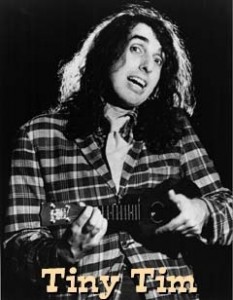 Mr. Tim, born Herbert Khaury on April 12, 1932, in Washington Heights, Manhattan, to a Polish Jewish mother and Lebanese Catholic father, personified the “let your freak flag fly” philosophy of the late 60s. He blew kisses, batted his eyes and tossed his wild, tinted hair as he strummed his ukelele and sang long-forgotten vaudeville tunes in his vibrato voice. He was probably the only sensation of the day to play a stringed instrument NOT made by Fender, Gibson, Gretsch or Rickenbacker.
Mr. Tim, born Herbert Khaury on April 12, 1932, in Washington Heights, Manhattan, to a Polish Jewish mother and Lebanese Catholic father, personified the “let your freak flag fly” philosophy of the late 60s. He blew kisses, batted his eyes and tossed his wild, tinted hair as he strummed his ukelele and sang long-forgotten vaudeville tunes in his vibrato voice. He was probably the only sensation of the day to play a stringed instrument NOT made by Fender, Gibson, Gretsch or Rickenbacker.
He got his start in the early 1960s performing in a Greenwich Village lesbian club called The Page 3, and eventually developed a local cult following. His big break came when he was booked for an episode of the top-rated Laugh In variety show. This led to a steady stream of appearances on programs hosted by the big names of the day: Ed Sullivan, Jackie Gleason and the king of late night TV, Johnny Carson. Johnny took a liking to the polite, mild-mannered oddball and offered to host Tiny’s wedding to 17-year-old “Miss Vicki” (Victoria May Budinger) on the Tonight Show on December 17, 1969. It’s estimated that 40 million viewers tuned in to witness the first-of-a-kind talk show event – and I was among them! As a kid I thought Tiny was all the rage and I managed to convince my mom to “wake me up for the wedding.” I was proud to announce to my fifth grade class the next day that I had witnessed a happening.
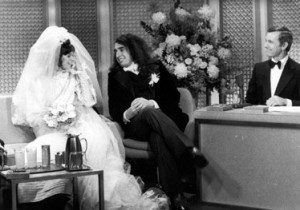 In 1968 Tiny Tim released an album on the Reprise label, “God Bless Tiny Tim,” which sold 20,000 copies and contained his sole hit, “Tip-Toe Through the Tulips.” (He and Miss Vicki named their daughter Tulip.) By the early 1970s his act had worn thin. He continued to plug away, appearing in small clubs and even performing with a circus for six months. He experienced a minor comeback in the 1990s, appearing on the Conan O’Brien, Howard Stern and Arsenio Hall shows. In an ironic twist of fate, he suffered a fatal heart attack while performing his signature song, “Tip-Toe,” during a 1999 show in Minneapolis.
In 1968 Tiny Tim released an album on the Reprise label, “God Bless Tiny Tim,” which sold 20,000 copies and contained his sole hit, “Tip-Toe Through the Tulips.” (He and Miss Vicki named their daughter Tulip.) By the early 1970s his act had worn thin. He continued to plug away, appearing in small clubs and even performing with a circus for six months. He experienced a minor comeback in the 1990s, appearing on the Conan O’Brien, Howard Stern and Arsenio Hall shows. In an ironic twist of fate, he suffered a fatal heart attack while performing his signature song, “Tip-Toe,” during a 1999 show in Minneapolis.
Tiny Tim was a physically unattractive man with numerous eccentricities, but he had the courage to stand proud on some of the country’s most famous stages, and the charisma to earn a small place among the hot acts of the hottest musical era in history. He died on November 30, 1996. RIP, Mr. Tim, and thanks for reminding us that being weird is wonderful.
Here’s Tiny, singing his signature song:
By Dana Spiardi, Nov 30, 2013
]]>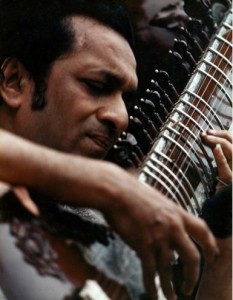 Contrary to popular belief, the Beatles were not the first rock band to use a sitar in a recording. That honor goes to the Yardbirds, who hired a sitar player to produce the famous riff in “Heart Full of Soul.” The band ultimately felt the sound was too soft, so Yardbird Jeff Beck replaced it with a sitar-sounding guitar effect.
Contrary to popular belief, the Beatles were not the first rock band to use a sitar in a recording. That honor goes to the Yardbirds, who hired a sitar player to produce the famous riff in “Heart Full of Soul.” The band ultimately felt the sound was too soft, so Yardbird Jeff Beck replaced it with a sitar-sounding guitar effect.
Meanwhile, at an LSD-drenched party at Zsa Zsa Gabor’s Bel Air mansion (which the Beatles were renting during their 1965 U.S. tour), Roger McGuinn and David Crosby of the Byrds were introducing George Harrison and his mates to the trippy wonders of the sitar. The Byrds and Ravi Shankar shared the same record label, and the American folkadelic rock band had recently become familiar with the Indian virtuoso’s work.
Soon, the Beatles would strike the psychedelic sitar chord heard ’round the world when they recorded the groundbreaking “Norwegian Wood” for their December 1965 album “Rubber Soul.” George Harrison became a lifelong disciple of Ravi, incorporating sitar into many of the Beatles’ subsequent songs. Brian Jones of the Rolling Stones – a natural born musician and fast learner – followed suit, playing a spooky, reptilian sitar riff on “Paint it Black,” the first number one single to feature the Indian instrument. The cosmic 1960s had begun, and all things Indian – from yoga and transcendental meditation to Nehru jackets and Madras shirts – became the latest rage.
Soon the sitar became the instrument du jour. It’s featured on the Monkees’ “This Just Doesn’t Seem To Be My Day,” Rick Nelson’s “Marshmallow Skies,” Scott McKenzie’s “San Francisco,” The Cowsills’ “The Rain, the Park, and Other Things,” John Fred and His Playboy Band’s “Judy in Disguise (With Glasses),” The Box Tops’ “Cry Like A Baby” (electric sitar), The Lemon Pipers’ “Green Tambourine” (electric sitar), Traffic’s “Paper Sun” and The Kinks’ “Fancy.”
The Mamas & The Papas, the Animals, the Moody Blues, Procol Harum and Jethro Tull all jumped on the trend, producing sitar-tinged songs. But like most good things, it eventually became overused and passé in the world of rock.
But Ravi Shankar’s fame never waned. He is the most well-known and honored of all Indian musicians, and continued to tour almost until the time of his death in 2012 at age 92. Thanks, Ravi, for your influence and your fabulous body of work.
Here’s the original version of The Yardbirds’ “Heart Full of Soul,” featuring sitar.
This is a great clip of the Stones performing “Paint it Black,” with Brian on sitar.
Here is Ravi with one of his most famous pupils, George Harrison. The Beatles used sitar in their music more than any other rock group.
© Dana Spiardi, April 7, 2015
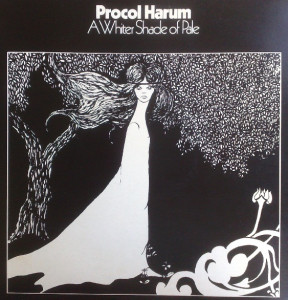 There have been more than 1,000 cover versions of “A Whiter Shade of Pale,” the debut single by British progressive-rock band Procol Harum. The hauntingly beautiful song with its Bach-like melody and trippy lyrics was a perfect soundtrack for the Summer of Love. It hit the #1 one spot on the U.K. charts on June 8, 1967, and remained there for six weeks. It reached #1 in Germany, the Netherlands, Ireland, and Australia and peaked at #5 on the U.S. charts. In fact, it’s one of fewer than 30 singles to have sold over 10 million copies worldwide, and has probably received more airplay than any other song in the U.K.
There have been more than 1,000 cover versions of “A Whiter Shade of Pale,” the debut single by British progressive-rock band Procol Harum. The hauntingly beautiful song with its Bach-like melody and trippy lyrics was a perfect soundtrack for the Summer of Love. It hit the #1 one spot on the U.K. charts on June 8, 1967, and remained there for six weeks. It reached #1 in Germany, the Netherlands, Ireland, and Australia and peaked at #5 on the U.S. charts. In fact, it’s one of fewer than 30 singles to have sold over 10 million copies worldwide, and has probably received more airplay than any other song in the U.K.
Keith Reid, who co-wrote the song with bandmates Gary Brooker and Matthew Fisher, said its title was based on a comment he overheard at a party: someone told a woman she’d “turned a whiter shade of pale.”
And just how did the band get that weird, hard-to-spell name? Their original manager, Guy Stevens, named the group after a friend’s Burmese cat: Procul Harun (Procul was the breeder’s prefix).
Here’s the original video of the song:
© Dana Spiardi, Feb 17, 2014
]]>
